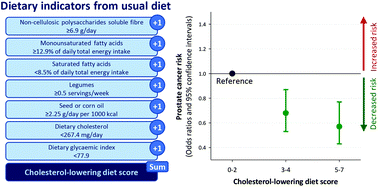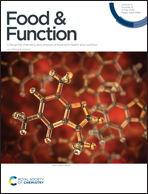Adherence to a cholesterol-lowering diet and the risk of prostate cancer†
Abstract
Evidence suggests a role of serum cholesterol in prostate cancer (PCa) development and of lipid lowering medications in PCa risk reduction. We developed a score for adherence to an established cholesterol-lowering diet and evaluated its association with PCa risk in a multicentric hospital-based case-control study (1294 cases; 1451 matched controls) in Italy (1992–2001). The score was derived from seven dietary indicators which have been reported to lower cholesterol levels: high intake of non-cellulosic polysaccharides (viscous fibres), monounsaturated fatty acids, legumes, seeds/corn oil; low intake of saturated fatty acids, dietary cholesterol, and glycaemic index. Odds ratios (ORs) and corresponding confidence intervals (CIs) were calculated through the unconditional logistic regression model. Although most of the dietary indicators alone were not significantly associated with reduced PCa risk, men who fulfilled 5 to 7 dietary indicators (187 cases and 281 controls) showed a 43% reduction in PCa risk compared to those with 0 to 2 indicators (OR: 0.57; 95% CI: 0.43–0.77). This association was not modified by socio-demographic characteristics or lifestyle factors. In conclusion, adherence to a cholesterol-lowering diet is a favourable factor against the risk of PCa, providing support to dietary guidelines that promote cholesterol reduction through plant-based diets.



 Please wait while we load your content...
Please wait while we load your content...